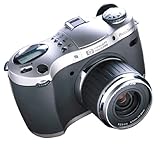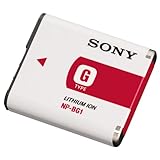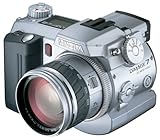
- 2.24 megapixel CCD creates 1600 x 1280 images for prints at sizes up to 8 x 10 inches
- 3x optical plus 2x digital Pentax zoom lens with autofocus
- Included 16 MB CompactFlash card holds 28 images at default resolution
- Connects with Macs and PCs via USB port
- 4 AA batteries included; special features include Jetsend infared printer connectivity, and sound capture with playback
Here's the recipe for a terrific series of digital cameras: start with the electronic-imaging expertise of Hewlett-Packard (HP), whose printers and scanners are among the most popular in the world. For great optics, add five decades of camera-making experience from Pentax. The result? HP's new lineup, featuring the C912 and C912xi (identical except for the software that comes with them) as its twin flagship models. These two cameras offer an intriguing set of features not offered by any other manufacturer (except Pentax, which also sells this model as the EI2000).
Though virtually every other digital camera uses a rangefinder setup, the C912 is a true single-lens reflex (SLR) camera. Light entering the lens is split by a prism: most is sent to the camera's sensor, but some goes up to the viewfinder. When you look through the viewfinder, the image you see is coming through the lens, so you can see precisely what you'll capture. You can also preview and review your shots with the 2-inch color LCD on the back of the camera. As an added feature, the LCD has a 90-degree flip-up design, allowing you to see images even if the camera is held at waist level.
The all-new, 36-bit CCD sensor from Philips is another unusual touch. At two-thirds of an inch, it's still much smaller than a 35mm negative, but it's larger than the sensors in most other manufacturers' cameras. On paper at least, this should improve image capture. We were surprised to discover that the sensor's proportions are "squarer" than those on most digital cameras--most 2-megapixel models capture 1,600 x 1,200 pixels in their images (a 4:3 ratio), but the HP captures a 1,600 x 1280 image (a 5:4 ratio). The traditional 4:3 ratio evolved because it matches the proportions of a computer monitor--with this camera, images displayed on your screen will have bars down the left and right edges, or will need to be cropped at the top or bottom to fill the screen. If you like making prints, images will also need some serious cropping to fill a 4-by-6 or 5-by-7 inch sheet, but the proportions are perfect for an 8-by-10 inch print.
While other companies are putting 3.3-megapixel sensors into their high-end models, HP has chosen to use a 2.2-megapixel CCD instead. Perhaps HP's engineers have reached the same conclusion we have--that for most users, 2 megapixels is the best balance between image quality and speed, price, and file size.
The Pentax lens zooms from 34 to 107 mm (35mm camera equivalent), and includes eight elements in seven groups, with one aspherical element. HP also adds a 2x digital zoom, which brings images closer at the expense of image quality. Instead of using a pair of buttons on the camera body, users adjust the zoom by twisting a ring on the lens--a traditional arrangement borrowed from film cameras. The lens also has an unusually powerful macro feature, focusing on items as close to the lens as 2 centimeters.
The camera looks well-made and fits nicely in your hands. The size, shape, and soft curves are all reminiscent of a classic SLR camera. A status LCD on the top panel lets you see vital camera settings, a very useful feature if you're not using the battery-draining color LCD display on the back of the camera. Images are stored on either Type I or the thicker Type II CompactFlash cards. Though it physically fits in the slot, IBM's Microdrive isn't compatible with the camera.
If you're a techno-tinkerer, you'll love the fact that the C912 uses Digita as its operating system (OS). When Digita was introduced several years ago, some predicted this OS would be adopted by virtually every digital camera manufacturer. In reality, Digita has proven to be just slightly more popular than Esperanto, finding its way into only a handful of cameras, mostly from Kodak and Minolta. Digita offers the potential to easily upgrade the camera's firmware, in addition to allowing advanced users to write software scripts to customize camera functions. As an example of the power and flexibility of the OS, one Digita-powered download available on the Internet lets you play emulated arcade video games on the camera's LCD display. For the average digital photographer, however, the biggest advantages to Digita are the colorful onscreen menus and the ease with which you'll be able to transfer revised firmware to your camera.
Virtually every camera feature can either be left on automatic operation or can be set for manual control. The ISO can be adjusted from 25 to 400, and the flash, shutter speed, aperture, and focus can also be controlled by hand. There's an integrated pop-up flash atop the camera, plus a hot-shoe mount for an external strobe unit.
HP has devised a flexible power system for this model. You can use four standard AA alkaline or rechargeable batteries, but for the ultimate in battery life, you can get a proprietary Olympus lithium-ion power pack and charger. With a suggested retail price of .00, the charging kit costs more than twice as much as a set of rechargeable AA batteries with charger, but lasts about twice as long on a charge as a set of high-capacity AA rechargeables.
If you're looking for a camera with the ultimate in resolution or the smallest dimensions, look elsewhere. But if you want a camera that looks and feels nice and has a good combination of features, the C912 is worth considering, especially if you're a fan of Pentax film cameras, love SLRs, or need a great macro lens.
Pros:
- True single-lens reflex camera
- Digita operating system for flexible upgrades
- Great lens with terrific macro
Cons:
- Nearly square images
- Takes Type II CompactFlash cards, but is not Microdrive compatible
List Price: $ 658.99
Price:










